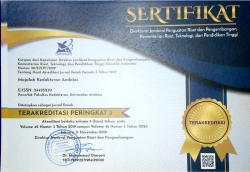Role Of Endoscopy To Reduce Extreme Hyperbilirubinemia In Lemmel Syndrome : A Case Report
Rini Suswita✉
Abstract
Duodenal diverticulum is a false diverticulum which is generally asymptomatic, frequently founded incidentally at endoscopy and 22% at autopsy. One to five percent of duodenal diverticulum have complications such as bilio-pancreatic complications. Lemmel syndrome is a complication of bilio-pancreatic characterized by jaundice, increased levels of bilirubin, liver and pancreatic enzymes. Reported a male patient, 72 years old, he complained abdominal pain in the right upper quadrant, yellow eyes and body, and dark tea-colored urine. Abdominal pain with Visual Analog Scale (VAS) value between 6 to 7. Blood test resulted prolonged APTT 37", PT 17.7", INR 1.66, increased in total bilirubin 26.0 mg/dL with a ratio of direct and indirect bilirubin was 15.0 mg/dL and 11.0 mg/dL consecutively, hyponatremia 133 mmol/L, and hypokalemia 5.2 mmol/L. Abdominal CT scan examination showed compression of the distal bile duct (common bile duct) and dilatation of the proximal bile duct, both intra and extra-hepatic bile ducts. ERCP with endoscopic sphincterotomy and biliary stent placement can be an option for drainage and decompression of the biliary tract to prevent further complications to severe hyperbilirubinemia and the effects of biliary tract obstruction.
Keywords
Surgery





















